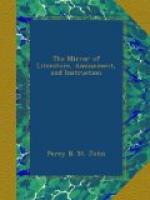In the early part of 1816, Mr. Brougham brought forward a motion for preserving and extending the liberty of the press, for which the ministers, particularly Lord Castlereagh (who knew well how to use “the delicious essence,”) passed on him the highest encomiums; and miscalculating the firmness of the bepraised, some persons thought the minister’s eulogy a lure for the member’s vote; but the result proved that Mr. Brougham was above all temptation. In the same year he made a tour on the continent: in France he was the object of much attention; and he afterwards visited the residence of the Princess of Wales, in Italy, as was supposed, on a mission of some importance.
In this year also, Mr. Brougham delivered two speeches in parliament, which are memorable for the truth of their prospective results. In one of them, on the treaty of the Holy Alliance, occurs the following almost prophetic passage: “I always think there is something suspicious in what a French writer calls, ’les abouchemens des rois.’ When crowned heads meet, the result of their united councils is not always favourable to the interest of humanity. It is not the first time that Austria, Russia, and Prussia have laid their heads together. On a former occasion, after professing a vast regard for truth, religion and justice, they adopted a course which brought such misery on their own subjects, as well as those of a neighbouring state—they made war against that unoffending country, which found little reason to felicitate itself on its conquerors being distinguished by Christian feelings. The war against Poland, and the subsequent partition of that devoted country, were prefaced by language very similar to that which this treaty contains; and the proclamation of the Empress Catherine, which wound up that fatal tragedy, had almost the very same words.”—The second speech to which we allude was on the abuses of ancient charitable institutions. Speaking of schools, the funds of which were landed and freehold property, Mr. Brougham remarked, “In one instance, where the funds of the charity are L450, one boy only is boarded and educated. In another case, where the revenue of the establishment is L1,500. a year, the appointment of a master lying in the lord of the manor, that gentleman gave it to a clergyman, who out of this sum paid a carpenter in the village L40.




